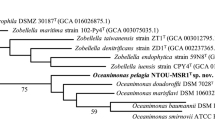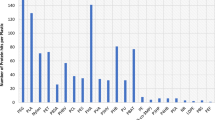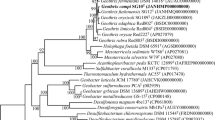Abstract
Despite its toxicity to many organisms, including most prokaryotes, carbon monoxide (CO) is utilized by some aerobic and anaerobic prokaryotes. Hydrogenogenic CO utilizers employ carbon monoxide dehydrogenase (CODH) and energy-converting hydrogenase (ECH) to oxidize CO and reduce protons to produce H2. Those prokaryotes constitute a rare biosphere and are difficult to detect even with PCR amplification and with metagenomic analyses. In this study, anaerobic CO-enrichment cultures followed by construction of metagenome assembled genomes (MAGs) detected high-quality MAGs from potential hydrogenogenic CO utilizers. Of 32 MAGs constructed, 5 were potential CO utilizer harboring CODH genes. Of the five MAGs, two were classified into the genus Thermolithobacter on the basis of 16S rRNA sequence identity, related to Carboxydocella tharmautotrophica 41, with an average nucleotide identity (ANI) of approximately 72%. Additionally, two were related to Geoglobus acetivorans with ANI values ranging from 75 to 77% to G. acetivorans SBH6, and one MAG was identified as Desulfotomaculum kuznetsovii with an ANI > 96% to D. kuznetsovii DSM 6115. The two Thermolithobacter MAGs identified in this study contained CODH-ECH gene clusters, and were therefore identified as potential hydrogenogenic CO utilizers. However, these MAGs harbored three CODH gene clusters that showed distinct physiological functions in addition to CODH-ECH gene clusters. In total, the five potential CO utilizer MAGs contained sixteen CODH genes. Among those CODHs, four sets did not cluster with any known CODH protein sequences (with an identity of > 90%), and the CODH database was expanded.





Similar content being viewed by others
References
Camacho C, Coulouris G, Avagyan V, Ma N, Papadopoulos J, Bealer K, Madden TL (2009) BLAST+: architecture and applications. BMC Bioinform 10(1):421. https://doi.org/10.1186/1471-2105-10-421
Capella-Gutiérrez S, Silla-Martínez JM, Gabaldón T (2009) TrimAl: a tool for automated alignment trimming in large-scale phylogenetic analyses. Bioinformatics 25(15):1972–1973. https://doi.org/10.1093/bioinformatics/btp348
Chaumeil P-A, Mussig AJ, Hugenholtz P, Parks DH (2020) GTDB-Tk: a toolkit to classify genomes with the genome taxonomy database. Bioinformatics 36(6):1925–1927. https://doi.org/10.1093/bioinformatics/btz848
Chen S, Zhou Y, Chen Y, Jia Gu (2018) Fastp: an ultra-fast all-in-one FASTQ preprocessor. Bioinformatics 34(17):i884–i890. https://doi.org/10.1093/bioinformatics/bty560
Denger K, Erko S, Alasdair MC (1999) Desulfonispora thiosulfatigenes gen. nov., sp. nov., a taurine-fermenting, thiosulfate-producing anaerobic bacterium. Int J Syst Evol Microbiol 49(4):1599–1603. https://doi.org/10.1099/00207713-49-4-1599
Dobbek H, Svetlitchnyi V, Gremer L, Huber R, Meyer O (2001) Crystal structure of a carbon monoxide dehydrogenase reveals a [Ni-4Fe-5S] cluster. Science 293(5533):1281–1285. https://doi.org/10.1126/science.1061500
Eddy SR (2011) Accelerated profile HMM searches. PLOS Comput Biol 7(10):e1002195. https://doi.org/10.1371/journal.pcbi.1002195
Edgar RC (2010) Search and clustering orders of magnitude faster than BLAST. Bioinformatics 26(19):2460–2461. https://doi.org/10.1093/bioinformatics/btq461
Fox JD, He Y, Shelver D, Roberts GP, Ludden PW (1996) Characterization of the region encoding the CO-induced hydrogenase of rhodospirillum rubrum. J Bacteriol 178(21):6200–6208. https://doi.org/10.1128/jb.178.21.6200-6208.1996
Fukuyama Y, Inoue M, Omae K, Yoshida T, Sako Y (2020) Chapter three—anaerobic and hydrogenogenic carbon monoxide-oxidizing prokaryotes: versatile microbial conversion of a toxic gas into an available energy. In: Gadd GM, Sariaslani S (eds) Advances in applied microbiology, vol 110. Academic Press, New York, pp 99–148. https://doi.org/10.1016/bs.aambs.2019.12.001
Harris CR, Jarrod Millman K, van der Walt SJ, Gommers R, Virtanen P, Cournapeau D, Wieser E et al (2020) Array programming with NumPy. Nature 585(7825):357–362. https://doi.org/10.1038/s41586-020-2649-2
Huerta-Cepas J, Forslund K, Coelho LP, Szklarczyk D, Jensen LJ, von Mering C, Bork P (2017) Fast genome-wide functional annotation through orthology assignment by EggNOG-mapper. Mol Biol Evol 34(8):2115–2122. https://doi.org/10.1093/molbev/msx148
Hyatt D, Chen G-L, LoCascio PF, Land ML, Larimer FW, Hauser LJ (2010) Prodigal: prokaryotic gene recognition and translation initiation site identification. BMC Bioinform 11(1):119. https://doi.org/10.1186/1471-2105-11-119
Imaura Y, Okamoto S, Hino T, Ogami Y, Katayama YA, Tanimura A, Inoue M, Kamikawa R, Yoshida T, Sako Y (2023) Isolation, genomic sequence and physiological characterization of Parageobacillus sp. G301, an isolate capable of both hydrogenogenic and aerobic carbon monoxide oxidation. Appl Environ Microbiol 0(0):e00185-23. https://doi.org/10.1128/aem.00185-23
Inoue M, Nakamoto I, Omae K, Oguro T, Ogata H, Yoshida T, Sako Y (2019) Structural and phylogenetic diversity of anaerobic carbon-monoxide dehydrogenases. Front Microbiol. https://doi.org/10.3389/fmicb.2018.03353
Inoue M, Omae K, Nakamoto I, Kamikawa R, Yoshida T, Sako Y (2022) Biome-specific distribution of Ni-containing carbon monoxide dehydrogenases. Extremophiles 26(1):9. https://doi.org/10.1007/s00792-022-01259-y
Jain C, Rodriguez-R LM, Phillippy AM, Konstantinidis KT, Aluru S (2018) High throughput ANI analysis of 90K prokaryotic genomes reveals clear species boundaries. Nat Commun 9(1):5114. https://doi.org/10.1038/s41467-018-07641-9
Kang DD, Li F, Kirton Ed, Thomas A, Egan R, An H, Wang Z (2019) MetaBAT 2: an adaptive binning algorithm for robust and efficient genome reconstruction from metagenome assemblies. PeerJ 7(July):e7359. https://doi.org/10.7717/peerj.7359
Katoh K, Standley DM (2013) MAFFT multiple sequence alignment software version 7: improvements in performance and usability. Mol Biol Evol 30(4):772–780. https://doi.org/10.1093/molbev/mst010
King GM, Weber CF (2007) Distribution, diversity and ecology of aerobic CO-oxidizing bacteria. Nat Rev Microbiol 5(2):107–118. https://doi.org/10.1038/nrmicro1595
Letunic I, Bork P (2021) Interactive tree of life (ITOL) v5: an online tool for phylogenetic tree display and annotation. Nucleic Acids Res 49(W1):W293–W296. https://doi.org/10.1093/nar/gkab301
Li H (2013) Aligning sequence reads, clone sequences and assembly contigs with BWA-MEM. arXiv:https://doi.org/10.48550/arXiv.1303.3997
Li D, Luo R, Liu C-M, Leung C-M, Ting H-F, Sadakane K, Yamashita H, Lam T-W (2016) MEGAHIT v1.0: a fast and scalable metagenome assembler driven by advanced methodologies and community practices. Methods Pan-Omics Anal Biol Data 102(June):3–11. https://doi.org/10.1016/j.ymeth.2016.02.020
Mardanov AV, Slododkina GB, Slobodkin AI, Beletsky AV, Gavrilov SN, Kublanov IV, Bonch-Osmolovskaya EA, Skryabin KG, Ravin NV (2015) The geoglobus acetivorans genome: Fe(III) reduction, acetate utilization, autotrophic growth, and degradation of aromatic compounds in a hyperthermophilic archaeon. Appl Environ Microbiol 81(3):1003–1012. https://doi.org/10.1128/AEM.02705-14
Matsen FA, Kodner RB, Virginia E, Armbrust. (2010) Pplacer: linear time maximum-likelihood and bayesian phylogenetic placement of sequences onto a fixed reference tree. BMC Bioinform 11(1):538. https://doi.org/10.1186/1471-2105-11-538
Merrouch M, Benvenuti M, Lorenzi M, Léger C, Fourmond V, Dementin S (2018) Maturation of the [Ni–4Fe–4S] active site of carbon monoxide dehydrogenases. J Biol Inorg Chem 23(4):613–620. https://doi.org/10.1007/s00775-018-1541-0
Nguyen L-T, Schmidt HA, von Haeseler A, Minh BQ (2015) IQ-TREE: a fast and effective stochastic algorithm for estimating maximum-likelihood phylogenies. Mol Biol Evol 32(1):268–274. https://doi.org/10.1093/molbev/msu300
Oelgeschläger E, Rother M (2008) Carbon monoxide-dependent energy metabolism in anaerobic bacteria and archaea. Arch Microbiol 190(3):257–269. https://doi.org/10.1007/s00203-008-0382-6
Omae K, Yoneda Y, Fukuyama Y, Yoshida T, Sako Y (2017) Genomic analysis of calderihabitans maritimus KKC1, a thermophilic, hydrogenogenic, carboxydotrophic bacterium isolated from marine sediment. Appl Environ Microbiol 83(15):e00832-e917. https://doi.org/10.1128/AEM.00832-17
Omae K, Fukuyama Y, Yasuda H, Mise K, Yoshida T, Sako Y (2019) Diversity and distribution of thermophilic hydrogenogenic carboxydotrophs revealed by microbial community analysis in sediments from multiple hydrothermal environments in Japan. Arch Microbiol 201(7):969–982. https://doi.org/10.1007/s00203-019-01661-9
Omae K, Oguro T, Inoue M, Fukuyama Y, Yoshida T, Sako Y (2021) Diversity analysis of thermophilic hydrogenogenic carboxydotrophs by carbon monoxide dehydrogenase amplicon sequencing using new primers. Extremophiles 25(1):61–76. https://doi.org/10.1007/s00792-020-01211-y
Omaye ST (2002) Metabolic modulation of carbon monoxide toxicity. Toxicology 180(2):139–150. https://doi.org/10.1016/S0300-483X(02)00387-6
Ondov BD, Treangen TJ, Melsted P, Mallonee AB, Bergman NH, Koren S, Phillippy AM (2016) Mash: fast genome and metagenome distance estimation using MinHash. Genome Biol 17(1):132. https://doi.org/10.1186/s13059-016-0997-x
Parks DH, Imelfort M, Skennerton CT, Hugenholtz P, Tyson GW (2015) CheckM: assessing the quality of microbial genomes recovered from isolates, single cells, and metagenomes. Genome Res 25(7):1043–1055. https://doi.org/10.1101/gr.186072.114
Parks DH, Chuvochina M, Waite DW, Rinke C, Skarshewski A, Chaumeil P-A, Hugenholtz P (2018) A standardized bacterial taxonomy based on genome phylogeny substantially revises the tree of life. Nat Biotechnol 36(10):996–1004. https://doi.org/10.1038/nbt.4229
Parks DH, Chuvochina M, Chaumeil P-A, Rinke C, Mussig AJ, Hugenholtz P (2020) A complete domain-to-species taxonomy for bacteria and archaea. Nat Biotechnol 38(9):1079–1086. https://doi.org/10.1038/s41587-020-0501-8
Parshina SN, Kijlstra S, Henstra AM, Sipma J, Plugge CM, Stams AJM (2005) Carbon monoxide conversion by thermophilic sulfate-reducing bacteria in pure culture and in co-culture with Carboxydothermus hydrogenoformans. Appl Microbiol Biotechnol 68(3):390–396. https://doi.org/10.1007/s00253-004-1878-x
Price MN, Dehal PS, Arkin AP (2010) FastTree 2—approximately maximum-likelihood trees for large alignments. PLoS ONE 5(3):e9490. https://doi.org/10.1371/journal.pone.0009490
Pritchard L, Glover RH, Humphris S, Elphinstone JG, Toth IK (2016) Genomics and taxonomy in diagnostics for food security: soft-rotting enterobacterial plant pathogens. Anal Methods 8(1):12–24. https://doi.org/10.1039/C5AY02550H
Schoelmerich MC, Müller V (2019) Energy conservation by a hydrogenase-dependent chemiosmotic mechanism in an ancient metabolic pathway. Proc Natl Acad Sci 116(13):6329–6334. https://doi.org/10.1073/pnas.1818580116
Shen W, Le S, Li Y, Hu F (2016) SeqKit: a cross-platform and ultrafast toolkit for FASTA/Q file manipulation. PLoS ONE 11(10):e0163962. https://doi.org/10.1371/journal.pone.0163962
Sokolova T, Hanel J, Onyenwoke RU, Reysenbach A-L, Banta A, Geyer R, González JM, Whitman WB, Wiegel J (2007) Novel chemolithotrophic, thermophilic, anaerobic bacteria Thermolithobacter ferrireducens gen. nov., sp. nov. and Thermolithobacter carboxydivorans sp. nov. Extremophiles 11(1):145–157. https://doi.org/10.1007/s00792-006-0022-5
Sokolova TG, Henstra A-M, Sipma J, Parshina SN, Stams AJM, Lebedinsky AV (2009) Diversity and ecophysiological features of thermophilic carboxydotrophic anaerobes. FEMS Microbiol Ecol 68(2):131–141. https://doi.org/10.1111/j.1574-6941.2009.00663.x
Sukumaran J, Holder M (2010) DendroPy: a python library for phylogenetic computing. Bioinformatics 26(12):1569–1571. https://doi.org/10.1093/bioinformatics/btq228
Suzuki J, Imaura Y, Nishida S, Kamikawa R, Yoshida T (2023) Draft genome sequence of Thermolongibacillus altinsuensis strain B1-1, a novel hydrogenogenic CO oxidizer isolated from sediment from Lake Biwa in Japan. Microbiol Resour Announc 0(0):e00334-23. https://doi.org/10.1128/mra.00334-23
Svetlitchnyi V, Peschel C, Acker G, Meyer O (2001) Two membrane-associated NiFeS-carbon monoxide dehydrogenases from the anaerobic carbon-monoxide-utilizing eubacterium Carboxydothermus hydrogenoformans. J Bacteriol 183(17):5134–5144. https://doi.org/10.1128/JB.183.17.5134-5144.2001
Tamura K, Stecher G, Kumar S (2021) MEGA11: molecular evolutionary genetics analysis version 11. Mol Biol Evol 38(7):3022–3027. https://doi.org/10.1093/molbev/msab120
Tanizawa Y, Fujisawa T, Nakamura Y (2018) DFAST: a flexible prokaryotic genome annotation pipeline for faster genome publication. Bioinformatics 34(6):1037–1039. https://doi.org/10.1093/bioinformatics/btx713
Techtmann SM, Colman AS, Robb FT (2009) ‘That which does not kill us only makes us stronger’: the role of carbon monoxide in thermophilic microbial consortia. Environ Microbiol 11(5):1027–1037. https://doi.org/10.1111/j.1462-2920.2009.01865.x
Techtmann S, Colman A, Lebedinsky A, Sokolova T, Robb F (2012) Evidence for horizontal gene transfer of anaerobic carbon monoxide dehydrogenases. Front Microbiol. https://doi.org/10.3389/fmicb.2012.00132
Wu M, Ren Q, Durkin AS, Daugherty SC, Brinkac LM, Dodson RJ, Madupu R et al (2005) Life in hot carbon monoxide: the complete genome sequence of Carboxydothermus hydrogenoformans Z-2901. PLoS Genet 1(5):e65. https://doi.org/10.1371/journal.pgen.0010065
Yoneda Y, Yoshida T, Daifuku T, Kitamura T, Inoue T, Kano S, Sako Y (2013) Quantitative detection of carboxydotrophic bacteria carboxydothermus in a hot aquatic environment. Fundam Appl Limnol 182(2):161–170
Yoneda Y, Kano SI, Yoshida T, Ikeda E, Fukuyama Y, Omae K, Kimura-Sakai S, Daifuku T, Watanabe T, Sako Y (2015) Detection of anaerobic carbon monoxide-oxidizing thermophiles in hydrothermal environments. FEMS Microbiol Ecol. https://doi.org/10.1093/femsec/fiv093
Acknowledgements
This work was supported by JSPS KAKENHI Grant number JP16H06381 (to Y.S.), the Institute for Fermentation, Osaka Grant number L-2021-1-002 (to T.Y.) and by JST SPRING, Grant number JPMJSP2110. Computation time was provided by Super Computer System, Institute for Chemical Research, Kyoto University.
Funding
Funding was supported by JST SPRING (JPMJSP2110), Japan Society for the Promotion of Science (JP16H06381), Institute for Fermentation, Osaka (L-2021-1-002).
Author information
Authors and Affiliations
Contributions
T.Y., R.K. and Y.S. conceived this research. K.O. prepared the samples. S.N. performed metagenomic sequence and analyzed the metagenomic data. M.I. supported the molecular analyses. S.N. wrote the draft manuscript and all authors commented on it. And all authors approved the final version of the manuscript.
Corresponding author
Ethics declarations
Competing interests
The authors have not disclosed any competing interests.
Additional information
Communicated by Yusuf Akhter.
Publisher's Note
Springer Nature remains neutral with regard to jurisdictional claims in published maps and institutional affiliations.
Rights and permissions
Springer Nature or its licensor (e.g. a society or other partner) holds exclusive rights to this article under a publishing agreement with the author(s) or other rightsholder(s); author self-archiving of the accepted manuscript version of this article is solely governed by the terms of such publishing agreement and applicable law.
About this article
Cite this article
Nishida, S., Omae, K., Inoue, M. et al. Construction of multiple metagenome assembled genomes containing carbon monoxide dehydrogenases from anaerobic carbon monoxide enrichment cultures. Arch Microbiol 205, 292 (2023). https://doi.org/10.1007/s00203-023-03635-4
Received:
Revised:
Accepted:
Published:
DOI: https://doi.org/10.1007/s00203-023-03635-4




